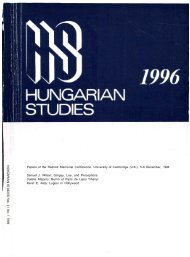The Canadian-American Review of Hungarian Studies - Vol. 4 ... - EPA
The Canadian-American Review of Hungarian Studies - Vol. 4 ... - EPA
The Canadian-American Review of Hungarian Studies - Vol. 4 ... - EPA
Create successful ePaper yourself
Turn your PDF publications into a flip-book with our unique Google optimized e-Paper software.
trated immigrants had become converts to radical ideologies. <strong>The</strong>iractivities were more likely to attract the attention <strong>of</strong> the Englishlanguage press than the work and views <strong>of</strong> the majority <strong>of</strong> immigrantswho were satisfied with the <strong>Canadian</strong> system <strong>of</strong> government.<strong>The</strong> immigrants' greatest problem was that their self-assessment as acultured, loyal, and moderate group was not shared by the <strong>Canadian</strong>public. <strong>The</strong> newcomer's boasts about the greatness <strong>of</strong> his own culturalheritage could easily be misinterpreted as mere bragging and his insistencethat he loved his adopted land, not taken at face value. <strong>Canadian</strong>shad to be convinced by fellow <strong>Canadian</strong>s whose impartiality could notbe questioned. Fortunately for New <strong>Canadian</strong>s in general and <strong>Hungarian</strong>-<strong>Canadian</strong>sin particular, a few <strong>Canadian</strong> individuals were willingto undertake this task. Perhaps the most notable among them wasWatson Kirkconnell.WatsonKirkconnellKirkconnell was born in the town <strong>of</strong> Port Hope, Ontario, in 1895. Hismother, in Kirkconnell's own words, had a "highly diversified ancestry,"whereas his father descended from an ethnic group noted forgiving so many distinguished sons and daughters to Canada: theScottish. An industrious student with a gift for languages and mathematics,the young Kirkconnell completed his high school education inLindsay, Ontario. In 1913 he entered Queen's University in Kingstonearning his B. A. and M. A. degrees in Classics. Following three years <strong>of</strong>war service and a prolonged illness, Kirkconnell entered Oxford Universityto earn a degree in Economics as preparation for a career injournalism. 9 But a journalist he did not become. In 1922 he accepted ateaching post in Winnipeg's Wesley College. <strong>The</strong> appointment turnedout to be the beginning <strong>of</strong> a distinguished academic career, whichincluded a stint as Head <strong>of</strong> Wesley College's Department <strong>of</strong> Classics(1939 to 1940), as Pr<strong>of</strong>essor <strong>of</strong> English and Department Head atMcMaster University in Hamilton (1940 to 1948), and, finally, asPresident <strong>of</strong> Acadia University (1948 to 1964).What brought Kirkconnell in touch with several New <strong>Canadian</strong>groups was his passion for verse translation. He developed this predilectionrather late in his youth. His talent for languages and Englishversification had been evident in primary school. He combined the twotalents for the first time during his stay at Queen's University, when hewas given a class assignment to translate Latin verse into English prose.In his memoirs, Kirkconnell relates that he accomplished the task in
















